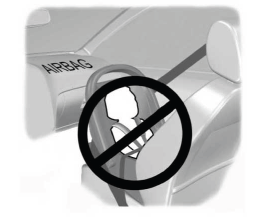Lincoln Aviator: Towing / Towing the Vehicle on Four Wheels
Emergency Towing
WARNING: If your vehicle has a steering wheel lock make sure the ignition is in the accessory or on position when being towed.
If your vehicle becomes inoperable without access to wheel dollies or a vehicle transport trailer, it can be flat-towed with all wheels on the ground, regardless of the powertrain and transmission configuration, under the following conditions:
- Your vehicle is facing forward for towing in a forward direction.
- Refer to the Manual Park Release procedure. Failing to do so could result in damage to the transmission.
- Maximum speed is 35 mph (56 km/h).
- Maximum distance is 50 mi (80 km).
Note: If you are unsure of the vehicle’s configuration, contact an authorized dealer.
Recreational Towing - Front-Wheel Drive Vehicles (If Equipped)
You cannot recreational tow your vehicle with all wheels on the ground because vehicle or transmission damage could occur. Place the front wheels on a two-wheel tow dolly. If you are using a tow dolly, follow the instructions specified by the equipment provider.
Recreational Towing - Rear-Wheel Drive Vehicles (If Equipped)
You cannot recreational tow your vehicle with all wheels on the ground because vehicle or transmission damage could occur. We recommend towing your vehicle with all four wheels off the ground, such as when using a car-hauling trailer. Otherwise, you cannot recreational tow your vehicle.
Recreational Towing - All-Wheel and Four-Wheel Drive Vehicles (If Equipped)
You cannot recreational tow your vehicle with all wheels on the ground because vehicle or transmission damage could occur. We recommend towing your vehicle with all four wheels off the ground, such as when using a car-hauling trailer. Otherwise, you cannot recreational tow your vehicle.
 Essential Towing Checks
Essential Towing Checks
Follow these guidelines for safe towing:
Do not tow a trailer until you drive your
vehicle at least 1,000 mi (1,600 km).
Consult your local motor vehicle laws for
towing a trailer...
Other information:
Lincoln Aviator 2020-2026 Service Manual: Removal and Installation - Active Noise Control Microphone
Removal Lower the headliner. Refer to: Headliner - Lowering (501-05 Interior Trim and Ornamentation, Removal and Installation). Disconnect the electrical connector, release the tabs and remove the ANC microphone. Installation To install, reverse the removal procedure...
Lincoln Aviator 2020-2026 Service Manual: Removal and Installation - Front Seatbelt Buckle
Removal NOTE: Removal steps in this procedure may contain installation details. NOTE: Driver seat shown, passenger seat similar. Remove the front seat. Refer to: Front Seat (501-10A Front Seats, Removal and Installation). Remove the front seatbelt buckle...
Categories
- Manuals Home
- Lincoln Aviator Owners Manual
- Lincoln Aviator Service Manual
- Tire Change Procedure
- Body and Paint
- Interior Lamps
- New on site
- Most important about car
Children and Airbags
WARNING: Airbags can kill or injure a child in a child restraint. Never place a rear-facing child restraint in front of an active airbag. If you must use a forward-facing child restraint in the front seat, move the seat upon which the child restraint is installed all the way back.


